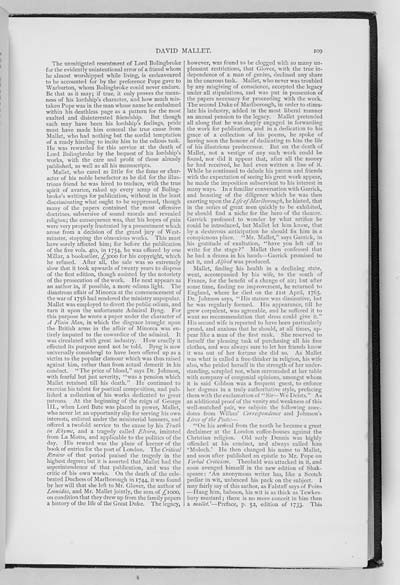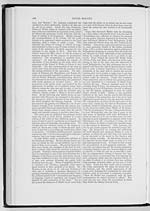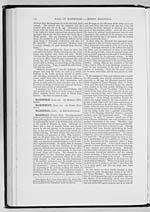109
The unmitigated resentment of Lord Bolingbroke
for the evidently unintentional error of a friend whom
he almost worshipped while living, is endeavoured
to be accounted for by the preference Pope gave to
Warburton, whom Bolingbroke could never endure.
Be that as it may; if true, it only proves the mean-
ness of his lordship's character, and how much mis-
taken Pope was in the man whose name he embalmed
within his deathless page as a pattern for the most
exalted and disinterested friendship. But though
such may have been his lordship's feelings, pride
must have made him conceal the true cause from
Mallet, who had nothing but the sordid temptation
of a ready hireling to incite him to the odious task.
He was rewarded for this service at the death of
Lord Bolingbroke by the bequest of his lordship's
works, with the care and profit of those already
published, as well as all his manuscripts.
Mallet, who cared as little for the fame or char-
acter of his noble benefactor as he did for the illus-
trious friend he was hired to traduce, with the true
spirit of avarice, raked up every scrap of Boling-
broke's writings for publication, without in the least
discriminating what ought to be suppressed, though
many of the papers contained the most offensive
doctrines, subversive of sound morals and revealed
religion; the consequence was, that his hopes of gain
were very properly frustrated by a presentment which
arose from a decision of the grand jury of West-
minster, stopping the obnoxious works. This must
have sorely affected him; for before the publication
of the five vols. 4to, in 1754, he was offered by one
Millar, a bookseller, �3000 for his copyright, which
he refused. After all, the sale was so extremely
slow that it took upwards of twenty years to dispose
of the first edition, though assisted by the notoriety
of the prosecution of the work. He next appears as
an author in, if possible, a more odious light. The
disastrous affair of Minorca at the commencement of
the war of 1756 had rendered the ministry unpopular.
Mallet was employed to divert the public odium, and
turn it upon the unfortunate Admiral Byng. For
this purpose he wrote a paper under the character of
A Plain Man, in which the disgrace brought upon
the British arms in the affair of Minorca was en-
tirely imputed to the cowardice of the admiral. It
was circulated with great industry. How cruelly it
effected its purpose need not be told. Byng is now
universally considered to have been offered up as a
victim to the popular clamour which was thus raised
against him, rather than from actual demerit in his
conduct. "The price of blood," says Dr. Johnson,
with fearful but just severity, "was a pension which
Mallet retained till his death." He continued to
exercise his talent for poetical composition, and pub-
lished a collection of his works dedicated to great
patrons. At the beginning of the reign of George
III., when Lord Bute was placed in power, Mallet,
who never let an opportunity slip for serving his own
interests, enlisted under the ministerial banners, and
offered a twofold service to the cause by his Truth
in Rhyme, and a tragedy called Elvira, imitated
from La Motte, and applicable to the politics of the
day. His reward was the place of keeper of the
book of entries for the port of London. The Critical
Review of that period praised the tragedy in the
highest degree; but it is asserted that Mallet had the
superintendence of that publication, and was the
critic of his own works. On the death of the cele-
brated Duchess of Marlborough in 1744, it was found
by her will that she left to Mr. Glover, the author of
Leonidas, and Mr. Mallet jointly, the sum of �10000,
on condition that they drew up from the family papers
a history of the life of the Great Duke. The legacy,
however, was found to be clogged with so many un-
pleasant restrictions, that Glover, with the true in-
dependence of a man of genius, declined any share
in the onerous task. Mallet, who never was troubled
by any misgiving of conscience, accepted the legacy
under all stipulations, and was put in possession of
the papers necessary for proceeding with the work.
The second Duke of Marlborough, in order to stimu-
late his industry, added in the most liberal manner
an annual pension to the legacy. Mallet pretended
all along that he was deeply engaged in forwarding
the work for publication, and in a dedication to his
grace of a collection of his poems, he spoke of
having soon the honour of dedicating to him the life
of his illustrious predecessor. But on the death of
Mallet, not a vestige of any such work could be
found, nor did it appear that, after all the money
he had received, he had even written a line of it.
While he continued to delude his patron and friends
with the expectation of seeing his great work appear,
he made the imposition subservient to his interest in
many ways. In a familiar conversation with Garrick,
and boasting of the diligence which he was then
exerting upon the Life of Marlborough, he hinted, that
in the series of great men quickly to be exhibited,
he should find a niche for the hero of the theatre.
Garrick professed to wonder by what artifice he
could be introduced, but Mallet let him know, that
by a dexterous anticipation he should fix him in a
conspicuous place. "Mr. Mallet," says Garrick, in
his gratitude of exultation, "have you left off to
write for the stage?" Mallet then confessed that
he had a drama in his hands�Garrick promised to
act it, and Alfred was produced.
Mallet, finding his health in a declining state,
went, accompanied by his wife, to the south of
France, for the benefit of a change of air; but after
some time, finding no improvement, he returned to
England, where he died on the 21st April, 1765.
Dr. Johnson says, "His stature was diminutive, but
he was regularly formed. His appearance, till he
grew corpulent, was agreeable, and he suffered it to
want no recommendation that dress could give it."
His second wife is reported to have been particularly
proud, and anxious that he should, at all times, ap-
pear like a man of the first rank. She reserved to
herself the pleasing task of purchasing all his fine
clothes, and was always sure to let her friends know
it was out of her fortune she did so. As Mallet
was what is called a free-thinker in religion, his wife
also, who prided herself in the strength of her under-
standing, scrupled not, when surrounded at her table
with company of congenial opinions, amongst whom
it is said Gibbon was a frequent guest, to enforce
her dogmas in a truly authoritative style, prefacing
them with the exclamation of "Sir�We Deists." As
an additional proof of the vanity and weakness of this
well-matched pair, we subjoin the following anec-
dotes from Wilkes' Correspondence and Johnson's
Lives of the Poets:�
"On his arrival from the north he became a great
declaimer at the London coffee-houses against the
Christian religion. Old surly Dennis was highly
offended at his conduct, and always called him
'Moloch.' He then changed his name to Mallet,
and soon after published an epistle to Mr. Pope on
Verbal Criticism. Theobald was attacked in it, and
soon avenged himself in the new edition of Shak-
speare: 'An anonymous writer has, like a Scotch
pedlar in wit, unbraced his pack on the subject. I
may fairly say of this author, as Falstaff says of Poins
�Hang him, baboon, his wit is as thick as Tewkes-
bury mustard; there is no more conceit in him than
a mallet.'�Preface, p. 52, edition of 1733. This

![]() Universal Viewer |
Universal Viewer | ![]() Mirador |
Large image | Transcription
Mirador |
Large image | Transcription
![]()

